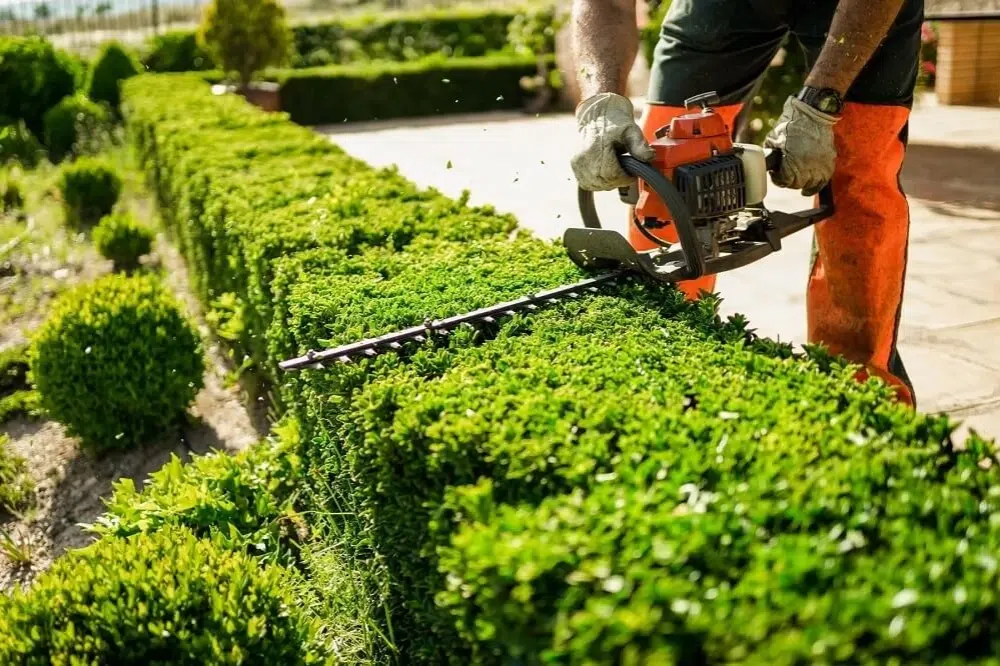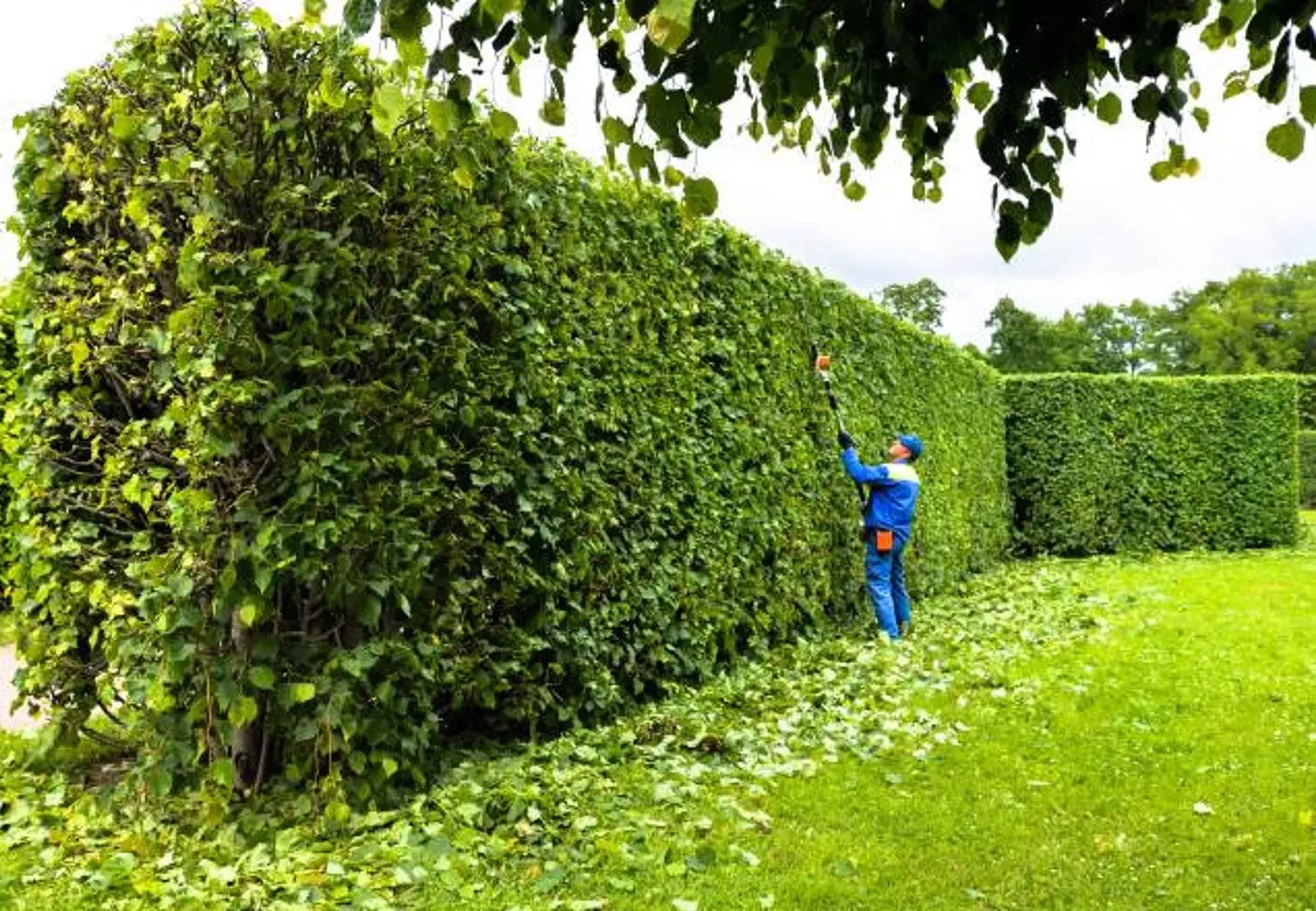An overgrown hedge isn’t just a cosmetic concern. In St. Gabriel’s warm, humid climate, fast growth can cause structural imbalance, block sunlight, attract pests, or interfere with walkways and drive visibility. Immediate trimming becomes necessary when hedges show physical deformities, obstructive overgrowth, or declining health.
If branches begin crossing, stems become woody, or new growth appears thin and sparse, it’s time for action. This guide explains how to identify warning signs, compares symptoms, and offers region-specific insights based on direct service experience. All advice is based on field knowledge gathered from servicing properties in East Baton Rouge Parish.
Physical Signs Your Hedge Needs Trimming
Overgrowth Into Walkways or Structures
Unchecked hedges can spill into paths, driveways, or fences. This obstructs access, damages property lines, and creates safety risks.
Bonus Tip: If trimming paths more than twice monthly, the hedge may need reshaping, not just trimming.
Sparse or Uneven Foliage
Excessive shading from overgrown canopies can block interior light, leading to hollow or bare hedge centers. Uneven sections suggest poor airflow or sun exposure.
Deformed or Woody Stems
As growth ages without maintenance, stems turn woody and lose flexibility. This weakens hedge shape and limits new growth potential.
Pest and Fungal Activity
Overgrowth creates humid pockets where aphids, spider mites, and mildew thrive. Visible leaf discoloration, webbing, or wilting indicate a trimming delay has already caused biological stress.
Comparison Table: Trimmable vs Non-Trimmable Signs
| Sign | Trimmable With Routine Care | Requires Immediate Action | Potential Long-Term Risk |
|---|---|---|---|
| Minor overgrowth | Yes | No | Low |
| Blocked driveways/walkways | No | Yes | Medium |
| Woody interior branches | No | Yes | High |
| Uneven canopy growth | Yes | No | Medium |
| Leaf drop or discoloration | No | Yes | High (possible infestation) |
Technical Indicators and Growth Metrics
| Metric | Normal Range | Problem Threshold |
|---|---|---|
| Growth extension rate | 1-2 inches per week (warm season) | >3 inches per week (unchecked) |
| Foliage density (outer layer) | 85-95% coverage | <70% coverage |
| Trimming frequency (per year) | 2-4 times | >6 or <2 (neglect or overcut) |
| Branch thickness (non-stem) | <0.5 inches | >1 inch (becoming woody) |
Regional Considerations for St. Gabriel, LA
The subtropical climate accelerates growth from late March through October. Frequent rain, heat, and high humidity can trigger growth spurts that double normal hedge extension rates. During hurricane season, dense hedges can also trap debris and add weight to branches, increasing break risk.
Louisiana State University AgCenter confirms that native shrubs like yaupon holly and wax myrtle benefit from post-storm thinning to reduce fungal exposure (LSU AgCenter, 2023).
Bonus Tip: Schedule hedge trims at the end of spring and start of fall to manage volume and shape without overstressing plant cycles.
Things to Consider Before Making a Decision
- Plant Type: Fast-growing evergreens need more frequent care than slow-growing ornamentals.
- Purpose: Privacy hedges require more height control than decorative borders.
- Access and Safety: Consider whether ladders or special tools are needed for safe trimming.
- Seasonality: Avoid trimming during peak flowering to prevent bloom loss.
- Local Ordinances: Ensure compliance with city or HOA maintenance codes.
Related Services from All Seasons Landscaping & Lawn Care
Only services directly related to hedge condition and landscape structure are included here:
- Landscaping Services – Structural shaping, seasonal pruning, and aesthetic design guidance.
- Lawn Care Services – Fertilization and watering plans that prevent overgrowth at the root level.
- Storm Cleanup Services – Removal of debris-laden or storm-damaged hedge branches.
- Drainage Services – Prevent root rot and water pooling that can deform hedge growth.
Common Questions
How short should a hedge be cut in summer?
In St. Gabriel, most privacy hedges should be maintained at 4–6 feet for airflow and manageable growth
Can trimming cause damage during hot months?
Yes, trimming during peak heat (July–August) without watering or mulching can lead to foliage burn.
Should I trim flowering hedges after they bloom?
Yes. Wait until flowering completes to avoid cutting off next season’s bud sites.
What tools are safest for quick trimming?
Hand shears for precision, pole trimmers for height, and electric trimmers for uniform cuts on hedges over 10 feet long.
Get Expert Insulation Guidance
To maintain healthy, well-shaped hedges in St. Gabriel’s demanding climate, expert attention helps avoid overgrowth, disease, and structural damage.
Contact All Seasons Landscaping & Lawn Care for consultation:
Phone: 225-276-8658 Email: [email protected]
FAQ Section
How often should hedges be trimmed in St. Gabriel?
Typically, two to four times annually, adjusted based on species and location.
What’s the best season for major hedge reshaping?
Late winter to early spring allows recovery before peak growth.
Can hedge overgrowth cause long-term plant damage?
Yes, it can lead to fungal infections, pest attraction, and root stress.
Are there legal limits to hedge height in St. Gabriel?
Some neighborhoods enforce HOA limits or sightline requirements—check local codes.
Is thinning different from trimming?
Yes. Thinning removes internal growth for airflow, while trimming focuses on exterior shaping.

